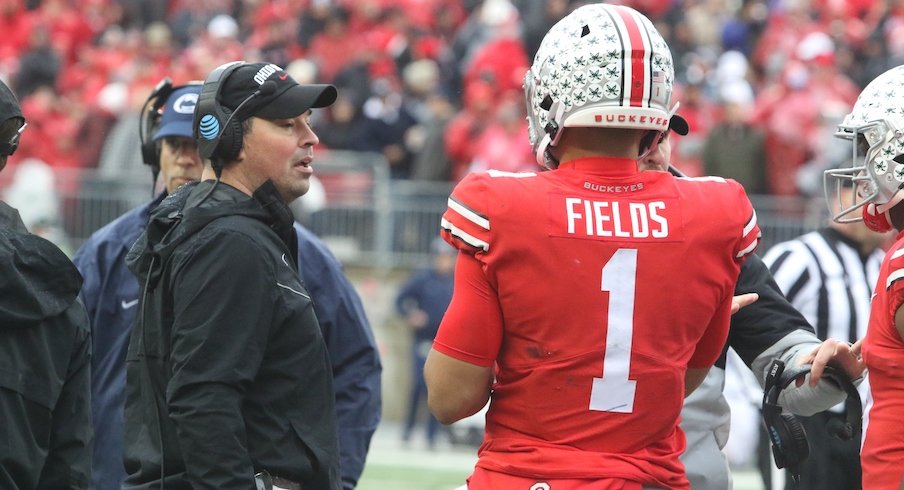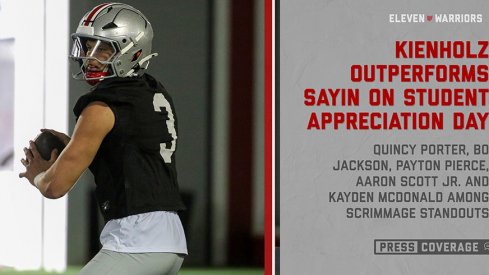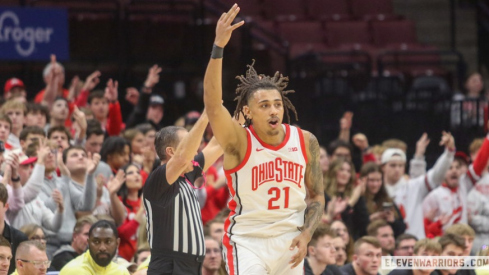Ohio State’s 2019 season is over, but a new year has arrived.
While there’s still more than eight months to go until the Buckeyes play their first game of the 2020 season, the preparation will start much sooner than that. Ohio State’s midyear enrollees will arrive on campus next week, and they’ll join the Buckeyes’ returning players in winter strength and conditioning workouts led by Mickey Marotti and his staff before returning to the football field for spring practices in March and April.
There will be plenty of more specific questions for the Buckeyes to answer along the way as they look to make another College Football Playoff run in Ryan Day’s second season as head coach, but as we begin a new decade of Ohio State football coverage here at Eleven Warriors, we begin by taking a look at five big-picture questions that will surround the Buckeyes all offseason and into the 2020 season, which starts with a home game against Bowling Green on Sept. 5.
Can Ryan Day keep the momentum going?
In his first season as a head coach at any level, Day has already made a strong case for being one of the best coaches in college football.
As successful as Ohio State was throughout the Urban Meyer era, Day led the Buckeyes to their best season in five years in his first year on the job. The 2019 Buckeyes won each of their first 13 games of the year by an average margin of 36.2 points per game and had top-five units nationally on both offense and defense. The Buckeyes won their third straight Big Ten championship and made their third appearance in the College Football Playoff, where they came up a touchdown short of beating Clemson for the first time ever and making it to the national championship game.
Ohio State was one of the three best teams in college football in 2019, and Day deserves tremendous credit for getting the Buckeyes to that position in his first year as a head coach. But while his first season went about as well as anyone could have reasonably expected, he now has to back it up.
Day inherited a program that was already in position to compete for national titles because of what Meyer built before him, and there have been other coaches who immediately achieved at the highest level before faltering in later years (Larry Coker, who won the national championship in his first season at Miami, comes to mind). There’s no question, though, that Day is off to a promising start that give Ohio State fans, players and recruits all reason to believe his teams will be successful in 2020 and years to come.
“We definitely have a lot of momentum, and a lot of respect from others now,” sophomore wide receiver Chris Olave said after the Buckeyes’ Fiesta Bowl loss. “Coach Day has a lot of momentum, and we all love him as a team.”
Can Justin Fields take his game to an even higher level?
Going into the 2019 season, one of the biggest questions was whether Justin Fields would be truly ready to lead Ohio State’s offense after less than a year on campus. He answered those questions quickly and convincingly, as he looked to be in full command of the Buckeyes’ offense from the season opener and had one of the best individual seasons ever for an Ohio State quarterback, completing 67.2 percent of his passes for 3,273 yards and 41 touchdowns with only three interceptions while running for 484 yards and another 10 touchdowns.
There won’t be any questions about whether Fields is the right man to lead Ohio State’s offense entering 2020. The Heisman Trophy finalist and Big Ten Offensive Player of the Year should enter next season as one of two favorites to win the Heisman – along with Clemson’s Trevor Lawrence, the quarterback who outdueled him in the Fiesta Bowl – and there won’t be any faux offseason quarterback competitions like there were last spring and summer.
Now, the question is how much better can Fields be – and how exactly can he be?
Fields was already both an efficient passer and a playmaker with his legs this season, and he didn’t make many of the typical mistakes you’d expect from a first-year starting quarterback, so there aren’t any glaring areas in which he needs to play better for the Buckeyes to have a chance to win a national title in 2020. There’s always room for improvement, though, and another year of development from Fields could potentially make Ohio State’s offense even more explosive, particularly in the passing game.
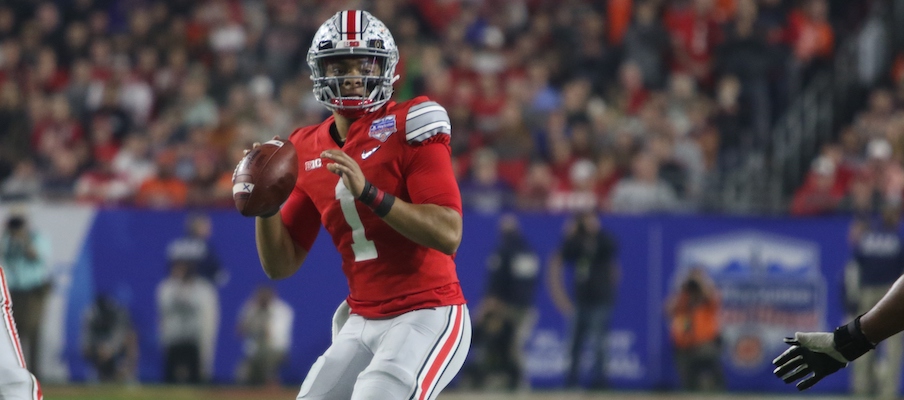
It’s also possible that Fields could have a second-year slump, as it’s not entirely uncommon for preseason Heisman frontrunners to fail to live up to the hype. Considering how consistent he was this past season and how quickly he acclimated to a new offense, though, any drastic step back seems unlikely. He is losing a few key pieces around him, including running back J.K. Dobbins and wide receivers K.J. Hill, Binjimen Victor and Austin Mack, but he’ll still have plenty of talent to work with including a bevy of potential stars in the receiving corps – led by Olave and Garrett Wilson – and three excellent returning starters on the offensive line in Thayer Munford, Josh Myers and Wyatt Davis.
How will J.K. Dobbins’ departure change Ohio State’s offense?
Ohio State might need to rely a little more heavily on Fields’ arm and legs next year, and Dobbins’ decision to enter the 2020 NFL draft is the reason for that.
The Buckeyes had excellent balance on offense this past season, led by a ground game that ranked sixth nationally in rushing yards per game and per carry and rushing touchdowns, and optimally, Day would like his offense to continue to be as balanced as possible going forward. They don’t have a clear-cut future star waiting in the wings to replace Dobbins, however, which means their running back production could take a hit.
Master Teague flashed as Dobbins’ backup this season, rushing for 789 yards on just 135 carries, but most of his production came on the back end of blowout wins. Whether he’s ready to step up and be a feature back in Ohio State’s offense is uncertain, and he’s the only running back on the roster who has seen regular playing time.
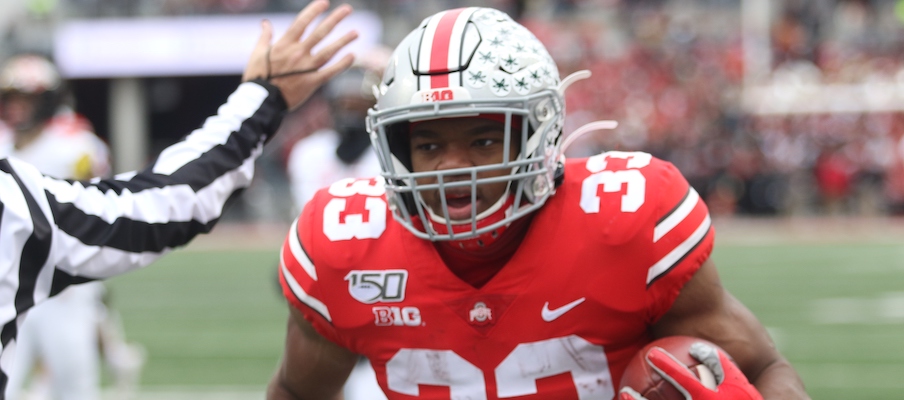
Ohio State will most likely take a committee approach to the running back position next year, with Teague starting but splitting snaps with one or both of Marcus Crowley and Steele Chambers, while Demario McCall – who has switched back-and-forth between running back and H-back throughout his career – and true freshman Miyan Williams could also feasibly mix in. They should also have great blocking in front of them once again, as Munford, Myers and Davis were all elite run blockers this past season while five-star recruits Harry Miller and Nicholas Petit-Frere are among the candidates to potentially fill the two open spots up front.
It’ll take time for any of those running backs to gain the trust Ohio State had in Dobbins this season, though, which could lead to a more quarterback-driven offense with Fields both passing and running the ball himself more often.
Can Ohio State’s defense sustain success without departing stars?
Perhaps the biggest question going into the 2019 season was whether Ohio State’s defense would be able to bounce back from one of the worst defensive seasons in school history in 2018, and the Buckeyes did that and then some.
Led by a new defensive coaching staff that replaced all of its previous assistants except for defensive line coach Larry Johnson, Ohio State trotted out a new defensive scheme that more effectively fit the strengths of its players, and the Buckeyes looked like a brand new team on that side of the ball. Ohio State allowed just 13.7 points per game and 259.7 yards per game in 2019 after giving up 25.5 points per game and 403.4 yards per game in 2018.
The Buckeyes’ defensive coaches could potentially have a more difficult job in 2020, however, because of the personnel they’ll have to replace.
If defensive end Chase Young and cornerbacks Jeff Okudah and Shaun Wade all declare for the 2020 NFL draft, Ohio State would have to replace eight starters on defense next season, also including defensive tackles Jashon Cornell and DaVon Hamilton, linebacker Malik Harrison, cornerback Damon Arnette and safety Jordan Fuller.
Up front, the Buckeyes will need second- and third-year players like Tyreke Smith, Zach Harrison, Tommy Togiai and Taron Vincent to make big leaps to make up for what they are losing in Young, Cornell, Hamilton and Robert Landers. Tuf Borland, Pete Werner and Baron Browning are all expected back to lead the linebacker corps, but Harrison was a star of that unit who also leaves big shoes to fill. The biggest question mark of the entire team could be the secondary, where Ohio State is not only potentially replacing all four of its starters, but will also have a new defensive backs coach following co-defensive coordinator Jeff Hafley’s departure to become the head coach at Boston College.
With the returning leadership of co-defensive coordinator Greg Mattison, and the talented prospects who could be ready to play bigger roles all over the defense, there’s no reason to expect a drastic drop back to where the Buckeyes were defensively in 2018. They’ll need many new faces to step up, though, to perform just as well as they did in 2019.
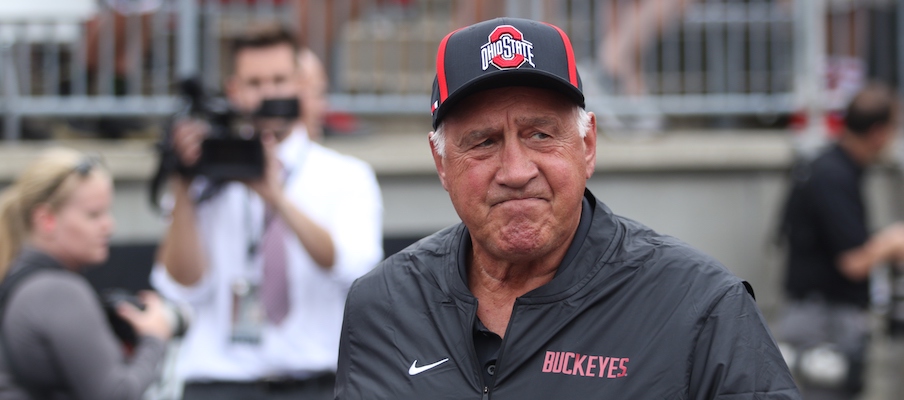
Can Ohio State get over the hump and win the national championship?
Winning national championships is always going to be the expectation at Ohio State, as athletic director Gene Smith made clear from the moment he hired Day as the Buckeyes’ new head coach. Because of how well Day’s first season went and the way it ended, however, those expectations will undoubtedly be amplified in 2020.
Now that Day has already proven he can lead Ohio State to an undefeated regular season, a Big Ten title and a College Football Playoff berth, the Buckeyes should be favored to win the conference and make a playoff run once again in 2020, especially since Fields will be back. The cloud cast by losing a semifinal game to Clemson in each of its last two playoff appearances, however, is one that will certainly loom over the Woody Hayes Athletic Center this offseason.
Even though it has been as consistently successful as any team not named Clemson or Alabama over the past half-decade, Ohio State hasn’t made a national championship game appearance since it won it all in 2014, allowing Dabo Swinney and Nick Saban’s squads to separate themselves as the preeminent programs in college football. Day and the Buckeyes closed that gap with their regular-season dominance this year, but they still have to go two steps further than they did this season to get back to the mountaintop of the sport.
How well they answer each of the first four questions will ultimately determine their answer to this question, but whether they can accomplish it or how close they come will ultimately be the biggest measure – as most Ohio State seasons are – by which the Buckeyes’ 2020 season is defined.
